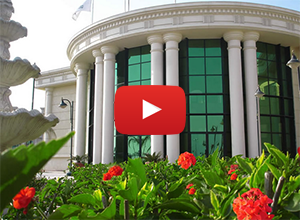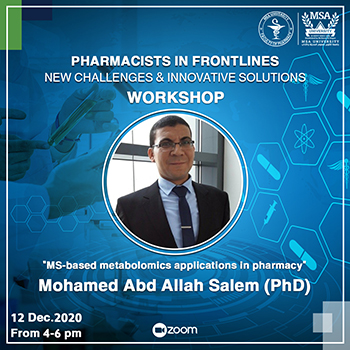 Mohamed Abd Allah Salem (PhD), Lecturer,Pharmacognosy Department, Faculty of Pharmacy, Menoufia University
Mohamed Abd Allah Salem (PhD), Lecturer,Pharmacognosy Department, Faculty of Pharmacy, Menoufia University
Title “MS-based metabolomics applications in pharmacy”
Description
Understanding of complex biological systems requires the measurement, analysis and integration of multiple compound classes of the living cell, usually determined by transcriptomic, proteomic and metabolomics measurements. Metabolomics studies aim for the identification and quantification of the complement of all small molecules and lipids within a biological system.
In recent years, metabolomics has emerged as cornerstones in the field of systems biology. This workshop will provide the participants with: Introduction to ‘omics’ technologies Experimental design and sample preparation in metabolomics studies MS-based metabolomics analysis Multivariate data analysis
To be eligible for this workshop you need to:
Have some basic experience in practical/theoretical gas/liquid chromatography (GC/LC) and mass spectrometry (MS).
Have a master’s degree or similar.
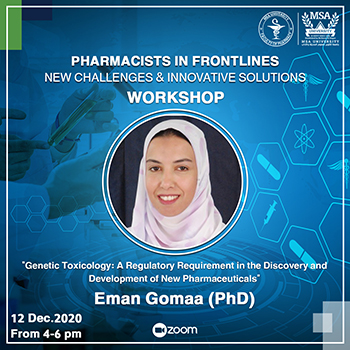 Eman Gomaa (PhD) Associate Professor of Biochemistry Department. Faculty of Pharmacy, MSA University. M.Sc. Fellow of Copenhagen University (Panum Institute), Denmark Ph.D. Fellow of the Technical University in Munich (Klinikum rechts der Isar), Germany Postdoctoral fellow of Mount Sinai School of Medicine, NY, USA. Postdoctoral fellow of Pierre et Marie Curie University, ParisVI - Currently Sorbonne, (L’Hopital Salpetrier Medical School), Paris, France
Eman Gomaa (PhD) Associate Professor of Biochemistry Department. Faculty of Pharmacy, MSA University. M.Sc. Fellow of Copenhagen University (Panum Institute), Denmark Ph.D. Fellow of the Technical University in Munich (Klinikum rechts der Isar), Germany Postdoctoral fellow of Mount Sinai School of Medicine, NY, USA. Postdoctoral fellow of Pierre et Marie Curie University, ParisVI - Currently Sorbonne, (L’Hopital Salpetrier Medical School), Paris, France
Title: “Genetic Toxicology: A Regulatory Requirement in the Discovery and Development of New Pharmaceuticals”
Description:
Genetic toxicology data is used as an alternate for long-term carcinogenicity data during early drug development. It represents an important part of preclinical safety assessment of new drugs and is required prior to Phase I/II clinical trials. It is designed to identify potentially hazardous drug candidates by detecting their genetic damage such as gene mutations and chromosomal aberration, which may be reflected in tumorigenic or heritable mutation potential of the drug.
Learning Outcomes:
Participants in this workshop will gain knowledge about the following:
- Introduction to genetic toxicology and its impact on drug discovery and development
- Differences between genotoxicity, mutagenicity and cytotoxicity
- Principle, procedures and data analysis of different techniques used in genetic toxicology during the process of drug development
- Single cell gel electrophoresis assay
- Methods for detection of chromosomal aberrations
- Micronucleus test
To be eligible for this workshop you need to:
Pharmacy graduates interested in genetics and toxicology.
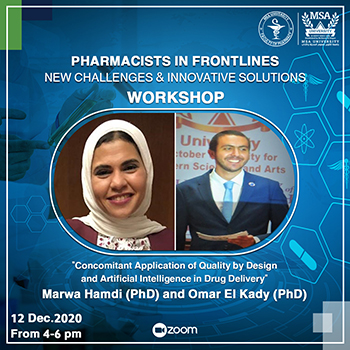 Marwa Hamdi (PhD) and Omar El Kady (PhD) ,Lecturer,Pharmaceutics Department, Faculty of Pharmacy,MSA University
Marwa Hamdi (PhD) and Omar El Kady (PhD) ,Lecturer,Pharmaceutics Department, Faculty of Pharmacy,MSA University
Title: “Concomitant Application of Quality by Design and Artificial Intelligence in Drug Delivery”
Description:
Quality by Design (QbD) is an industry initiative supported by regulators. However, it is also a systematic method of process development which delivers consistency, robustness and increased process knowledge. QbD is certainly becoming a scientific, risk based proactive approach to pharmaceutical product development. Artificial intelligence can be potentially used to create the multidimensional interactions of input variables and to closely bind these variables to a design space.
Goal
This workshop will provide the participants with:
- Comprehensive understanding of QbD including current uses and promised use
- The overall logic and flow of the QbD development process, which includes the use and application of the various tools
- Development and use of Quality Target Product Profiles (QTPPs)
- Definition and verification of Critical Quality Attributes (CQAs), Critical Material Attributes (CMAs) and Critical Process Parameters (CPPs)
- Facets of statistical design of experiments (DOEs), using different response surface methodologies and artificial intelligence technique.
- Design Space and its application in process control, lifecycle management, understanding design space limits.
- Development and optimization of process control strategies.
- Direct application of the steps of QbD and artificial intelligence in the drug formulation.
To be eligible for this workshop you need to:
Have some basic knowledge on statistical analysis
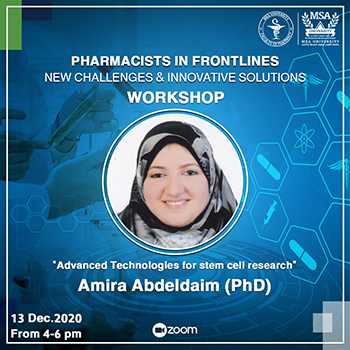 Amira Abdeldaim (PhD), Lecturer of Biochemistry, Faculty of Pharmacy, MSA University. Postdoctoral researcher in The AIDS research center, Kunamoto University, Japan Postdoctoral researcher in the International research center for medical sciences (IRCMS), Kunamoto University, Japan.
Amira Abdeldaim (PhD), Lecturer of Biochemistry, Faculty of Pharmacy, MSA University. Postdoctoral researcher in The AIDS research center, Kunamoto University, Japan Postdoctoral researcher in the International research center for medical sciences (IRCMS), Kunamoto University, Japan.
Title: “Advanced Technologies for stem cell research”
Description
During this workshop, we will discuss different technologies utilized in the stem cell research to analyse the cell differentiation and explore the mechanisms controlling cell differentiation and self-renewability.
To be eligible for this workshop you need to:
With background of molecular biology and stem cell biology
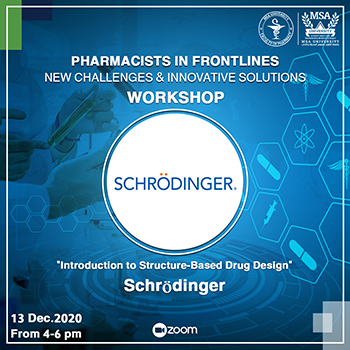 Schrödinger
Schrödinger
Title: “Introduction to Structure-Based Drug Design”
Description
This workshop is powered by Schrödinger’s industry-leading computational platform to accelerate drug discovery and materials design is deployed by leading biopharmaceutical and industrial companies, academic institutions and government laboratories worldwide. Schrödinger is also applying its computational platform to a diverse and extensive pipeline of drug discovery programs in collaboration with pharmaceutical companies and has co-founded leading biotech companies.
In addition, Schrödinger is using its platform to advance a pipeline of internal, wholly-owned drug discovery programs. It will include 1-hour live demo and the distribution of evaluation licenses for an opportunity to try out the Schrödinger's drug discovery suite “Maestro”.
To be eligible for this workshop you need to:
Pharmacy Postgraduates with interest in medicinal chemistry
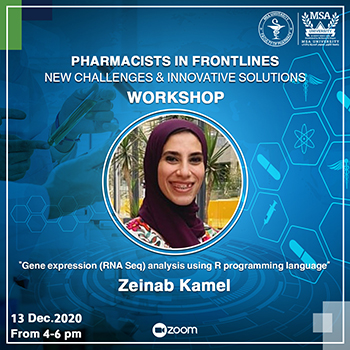 Zeinab Kamel-, Microbiology and Immunology Department, Faculty of Pharmacy, MSA University.
Zeinab Kamel-, Microbiology and Immunology Department, Faculty of Pharmacy, MSA University.
Title:“Gene expression (RNA Seq) analysis using R programming language”
Description:
The workshop will briefly discuss and provide hands-on practice with RNA sequencing and analysis using computational biology and bioinformatics. An overview will be given on the fundamentals of OMICs based sciences, in particular, transcriptome. The main steps of RNA-sequencing and analysis workflow will be highlighted, including; cDNA library preparation, a quality check of fastq files, genome alignment, and identification of differentially expressed genes.
Learning outcomes:
- By the end of this workshop, the participants will be able to:
- Understand fundamentals of molecular biology and transcriptomes.
- Outline the required steps of RNA-seq analysis workflow.
- Recognize and distinguish between different parts of Rstudio.
- Run a script and interpret results of data analysis on Rstudio.
- Annotate the expressed genes on web-based tools (Gprofiler or GSEA).
To be eligible for this workshop you need to:
Have some basic knowledge of OMICs-based science
Know the fundamentals of R programming language
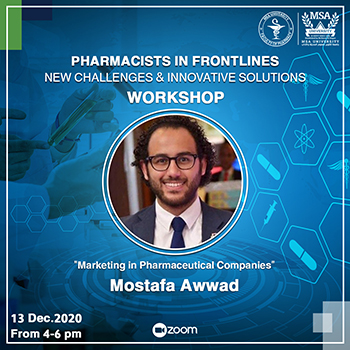 Mostafa Awwad Cardiovascular Renal Metabolic Marketing Manager. AstraZeneca
Mostafa Awwad Cardiovascular Renal Metabolic Marketing Manager. AstraZeneca
Title: “Marketing in Pharmaceutical Companies”
MSA University Campus Map
Main Office - 6th Oct. Campus
26 July Mehwar Road intersection with Wahat Road, 6th October City. Egypt.
Tel. : 3837-1113
Tel. : 3837-1115
Tel. : 3837-1516
Tel. : 3837-1519
Admission Office: admission@msa.edu.eg
Graduates Affairs: sgaffairs@msa.edu.eg
Mobile: 01270447292
Hotline : 16672
International Hotline: 002-0216672

